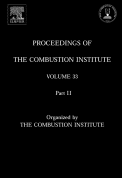
PROCEEDINGS OF THE COMBUSTION INSTITUTE
Scope & Guideline
Transforming Challenges into Solutions in Combustion
Introduction
Aims and Scopes
- Combustion Kinetics and Mechanisms:
Research focusing on the fundamental chemical kinetics of combustion processes, including autoignition, flame propagation, and the mechanisms of fuel reactivity. - Advanced Diagnostic Techniques:
Development and application of advanced diagnostics such as laser-induced fluorescence (LIF), Raman scattering, and high-speed imaging for studying combustion phenomena at various scales. - Numerical Modeling and Simulation:
Utilization of computational fluid dynamics (CFD) and direct numerical simulations (DNS) to model complex combustion systems, including turbulent flames and reactive flows. - Emission Control and Environmental Impact:
Studies aimed at understanding and mitigating emissions from combustion processes, including the formation of pollutants like NOx and soot. - Alternative Fuels and Energy Sources:
Exploration of combustion characteristics and performance of alternative fuels, such as ammonia, biofuels, and hydrogen, in various combustion systems. - Combustion Instabilities:
Research on the phenomena of combustion instabilities, including thermoacoustic oscillations and their impact on flame stability and performance in engines and combustors. - Thermal and Chemical Dynamics:
Investigations into the thermal and chemical interactions within flames, including heat transfer, reaction kinetics, and particle dynamics.
Trending and Emerging
- Machine Learning and AI in Combustion:
Increasing integration of machine learning techniques for modeling combustion processes, enhancing predictive capabilities, and optimizing combustion systems. - Sustainable and Renewable Fuels:
A growing emphasis on the combustion characteristics and emissions of sustainable fuels such as ammonia, biofuels, and hydrogen, aligning with global energy transition goals. - Advanced Diagnostic and Imaging Techniques:
Enhanced focus on employing advanced diagnostic methods for real-time monitoring of combustion processes, including high-speed imaging and multi-species measurements. - Reactive Flow Dynamics and Turbulence:
Research on the interaction between turbulence and reaction dynamics is gaining traction, with studies exploring complex turbulent combustion scenarios. - Detonation and Shock Wave Dynamics:
Increased interest in the dynamics of detonations and shock waves, particularly in high-energy and high-pressure environments, reflecting a shift towards high-performance applications. - Emission Reduction Strategies:
Emerging research on innovative techniques and technologies for reducing emissions from combustion systems, including catalytic processes and fuel modification.
Declining or Waning
- Classical Hydrocarbon Fuels:
Research on traditional hydrocarbon fuels, such as gasoline and diesel, appears to be declining as the focus shifts towards alternative fuels and sustainable energy sources. - Basic Combustion Theory:
Theoretical studies exploring fundamental combustion principles are less prevalent as more applied research and experimental studies take precedence. - Low-Pressure Combustion Studies:
Investigations into combustion phenomena at low pressures are waning, possibly due to the increased relevance of high-pressure combustion scenarios in practical applications. - Single-Fuel Studies:
Research centered on the combustion characteristics of individual fuels, without consideration of blends or alternative fuel combinations, is becoming less common. - Static Flame Studies:
Investigations of static or non-dynamic flame behaviors are being overshadowed by studies focusing on dynamic and real-world combustion scenarios.
Similar Journals

FLOW TURBULENCE AND COMBUSTION
Pioneering research in fluid mechanics and turbulent flow.Flow Turbulence and Combustion is a premier peer-reviewed journal published by Springer, focusing on the intricate dynamics of fluid mechanics, turbulence, and combustion phenomena. With an impressive impact factor and categorized in the Q1 quartile across Chemical Engineering, Physical and Theoretical Chemistry, and Physics and Astronomy, this journal serves as an invaluable resource for researchers, professionals, and students engaged in these fields. Founded in 1996, it presents cutting-edge research, comprehensive reviews, and innovative methodologies that advance the understanding of turbulent flow and combustion processes. The journal's commitment to open access ensures broad dissemination of knowledge, fostering greater collaboration and advancement in scientific inquiry. Based in the Netherlands, Flow Turbulence and Combustion continues to serve as a crucial platform for reporting significant findings and developments until 2024, appealing to a global audience passionate about fluid dynamics.
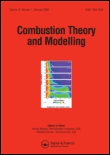
COMBUSTION THEORY AND MODELLING
Unraveling the Complexities of Combustion TheoryCombustion Theory and Modelling is a pivotal journal for researchers and professionals in the fields of chemical engineering, energy technology, and combustion science. Published by Taylor & Francis Ltd, this journal, with an ISSN of 1364-7830 and E-ISSN 1741-3559, provides a platform for disseminating significant advances in our understanding of combustion processes and their applications. With a solid impact factor, as reflected in its Q2 ranking across multiple categories including Chemical Engineering, Energy Engineering, and Modeling and Simulation, it serves not only to enhance theoretical knowledge but also to bridge the gap between theory and practical applications. The journal spans a wide timeline from 1997 to 2024, ensuring that it covers both foundational studies and cutting-edge research. Situated in the UK, the journal actively invites submissions that contribute to the evolving landscape of combustion science, making it an essential resource for academics, industry professionals, and students keen on exploring the dynamics of energy and fuel technologies.

Thermophysics and Aeromechanics
Elevating Knowledge in Thermophysics and AeromechanicsThermophysics and Aeromechanics, published by PLEIADES PUBLISHING INC, is an esteemed journal dedicated to advancing the fields of aerospace engineering, energy engineering, modeling and simulation, as well as nuclear and high energy physics. With an ISSN of 0869-8643 and E-ISSN 1531-8699, this journal serves as a vital platform for researchers and professionals working at the intersection of thermophysics and aeromechanics, delivering cutting-edge research, reviews, and case studies. Despite its current position in Quartile Q4 across multiple categories, including aerospace and energy engineering, it provides a unique opportunity for emerging ideas in these domains to gain visibility and impact. The journal's convergence of diverse scientific disciplines is critical for fostering innovation and technological advancements, making it an essential resource for students, practitioners, and academics alike. In this era of rapid scientific development, Thermophysics and Aeromechanics plays a pivotal role in disseminating knowledge and facilitating interdisciplinary collaboration among a global audience.

JOURNAL OF ENGINEERING PHYSICS AND THERMOPHYSICS
Pioneering Research for Tomorrow's Engineering ChallengesJOURNAL OF ENGINEERING PHYSICS AND THERMOPHYSICS, published by Springer, is a vital resource for researchers and professionals in the fields of engineering physics and thermophysics. With an ISSN of 1062-0125 and an E-ISSN of 1573-871X, this esteemed journal has been disseminating high-quality research since its inception, covering critical advancements in both condensed matter physics and various engineering disciplines. Despite its classification within the third quartile in both Scopus categories for 2023, the journal remains a significant conduit for innovative studies that push the boundaries of knowledge in thermal and physical engineering, with converged years spanning from 1992 to 1997 and 2004 to 2024. The journal does not offer open access, which means subscribers and institutions have exclusive access to its rich content. As the field continues to evolve, JOURNAL OF ENGINEERING PHYSICS AND THERMOPHYSICS plays an essential role in fostering scholarly discussions and supporting the academic community in tackling contemporary engineering challenges.
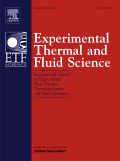
EXPERIMENTAL THERMAL AND FLUID SCIENCE
Innovating the future of engineering through experimental research.EXPERIMENTAL THERMAL AND FLUID SCIENCE is a prestigious academic journal published by Elsevier Science Inc, dedicated to advancing the fields of thermal and fluid sciences. With a strong focus on innovative experimental research, it plays a crucial role in disseminating new knowledge and techniques across multiple domains, including Aerospace Engineering, Chemical Engineering, Fluid Flow and Transfer Processes, Mechanical Engineering, and Nuclear Engineering. Holding a notable impact factor and ranking in the Q1 quartile across these categories since 2023, the journal is recognized for its high-quality contributions, which appeal to a diverse audience of researchers, industry professionals, and students alike. Additionally, with dedicated coverage from its inception in 1988 to projections extending through 2025, EXPERIMENTAL THERMAL AND FLUID SCIENCE provides a vital platform for sharing advancements in experimental techniques and findings that shape the future of engineering and applied sciences.
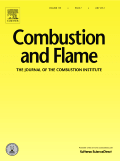
Combustion and Flame
Igniting Innovation in Combustion ScienceCombustion and Flame is a premier academic journal published by Elsevier Science Inc, dedicated to advancing the field of combustion science. Since its inception in 1957, this journal has consistently provided a platform for rigorous research and groundbreaking discoveries in the realms of Chemical Engineering, Chemistry, and Energy Engineering, illustrating a significant Q1 ranking across multiple categories, including Fuel Technology and Physics. With an impressive Scopus ranking, comprising the top 10% in fields such as General Physics and Astronomy, and General Chemical Engineering, Combustion and Flame serves as a critical resource for researchers, professionals, and students aiming to explore the complexities of combustion phenomena and their applications. Although it does not offer open access, the journal is known for its comprehensive articles and innovative research papers, fostering scholarly dialogue and the development of emerging technologies. The journal aims to connect researchers globally, ensuring that important findings are shared and disseminated effectively.

Applications in Energy and Combustion Science
Exploring Cutting-Edge Applications in Energy TechnologiesWelcome to Applications in Energy and Combustion Science, a premier open-access journal published by ELSEVIER that has been at the forefront of research since 2020. With the ISSN 2666-352X, this journal is dedicated to advancing the knowledge and application of energy technologies and combustion systems, reflecting a strong commitment to the evolving demands of the field. Based in the United Kingdom and recognized for its robust contributions, it has achieved noteworthy status in the 2023 rankings: a Q1 classification in both Chemical Engineering (miscellaneous) and Fuel Technology, alongside a Q2 standing in Energy (miscellaneous). Researchers will find it a significant platform, with Scopus rankings placing it among the top tiers in various categories. This journal offers an essential resource for professionals and students aiming to stay abreast of innovative developments and applications in the critical areas of energy and combustion, ensuring broad accessibility and dissemination of research findings.

Propulsion and Power Research
Advancing the Frontiers of Propulsion and Power.Propulsion and Power Research, published by KEAI PUBLISHING LTD, is a leading Open Access journal that has been advancing the field of propulsion and power systems since its inception in 2012. With its commitment to fostering scientific discourse and innovation, the journal has gained a prominent position within academia, achieving a Q1 ranking in multiple categories such as Aerospace Engineering, Automotive Engineering, and Fluid Flow and Transfer Processes as of 2023. With an impressive ranking of #18 out of 153 in Aerospace Engineering and consistent recognition in the Scopus rankings, the journal explores critical advancements and research findings that propel the industry forward. As an Open Access publication, it ensures that groundbreaking research is readily available to a broad audience, enhancing collaboration between researchers, practitioners, and students. The journal's scope encompasses a wide range of topics within propulsion and energy solutions, making it an essential resource for anyone keen on discovering significant developments in this dynamic field.
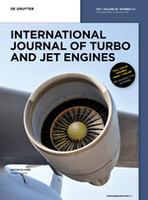
INTERNATIONAL JOURNAL OF TURBO & JET-ENGINES
Exploring Innovations in Turbo & Jet Engine TechnologyINTERNATIONAL JOURNAL OF TURBO & JET-ENGINES, published by WALTER DE GRUYTER GMBH, is an esteemed academic journal dedicated to the field of aerospace engineering, specifically focusing on the innovative development and application of turbo and jet engine technologies. Established in 1985, this journal has maintained its commitment to advancing scholarly research and discussion, attracting contributions from leading experts across the globe. With a Scopus rank of #91 out of 153 in the field of Aerospace Engineering, placing it in the 40th percentile and categorized in Q3 for 2023, the journal provides a vital platform for disseminating high-quality research findings and insights into evolving engine technologies. Although it follows a subscription model, its rigorous peer-review process ensures that published articles contribute significantly to the body of knowledge in aerospace engineering and related disciplines. For researchers, professionals, and students alike, the INTERNATIONAL JOURNAL OF TURBO & JET-ENGINES stands as a crucial resource for staying updated on the latest advances and trends in turbojet and turbofan systems.

Russian Journal of Physical Chemistry B
Advancing the frontiers of physical chemistry.Russian Journal of Physical Chemistry B, published by MAIK NAUKA/INTERPERIODICA/SPRINGER, serves as a vital platform for the dissemination of novel research in the field of physical and theoretical chemistry. With an ISSN of 1990-7931 and an E-ISSN of 1990-7923, this journal has established itself in the academic landscape since its inception in 2008, continuing to publish groundbreaking studies that push the boundaries of chemical research through 2024. Ranked in the Q3 category in Physical and Theoretical Chemistry, it holds a Scopus Rank of 139/189, showcasing its significance despite a competitive field. The journal does not currently offer open access but remains dedicated to advancing knowledge and innovation within its niche, fostering collaboration among chemists, researchers, and educators. As a valuable resource for those seeking to stay abreast of the latest developments and theoretical advancements, the Russian Journal of Physical Chemistry B is an excellent choice for professionals and students alike.